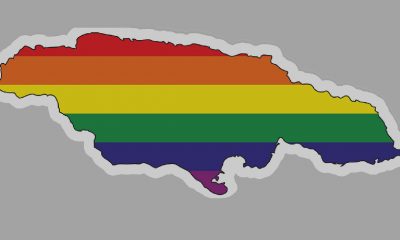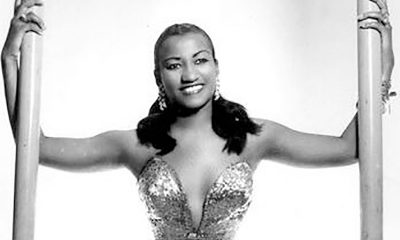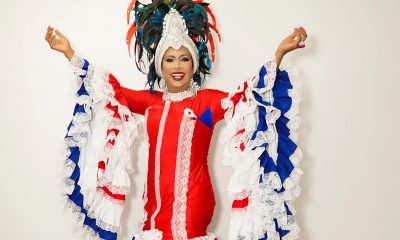News
Casa Tomada Mirarte es la casa de todes en La Habana
Una pareja de lesbianas abrieron el espacio hace cuatro años
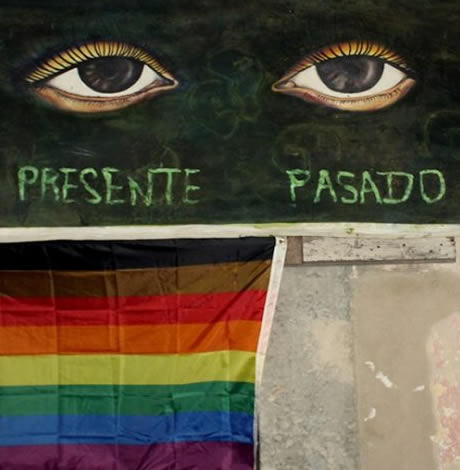
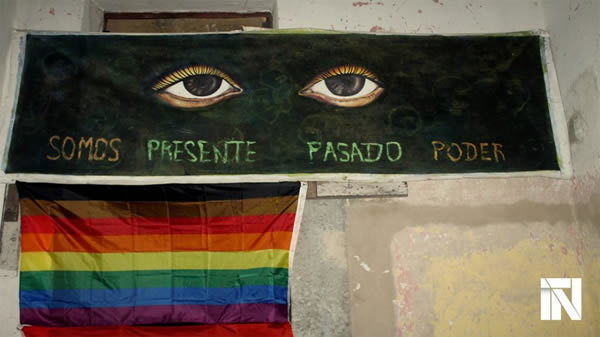
Nota del editor: Tremenda Nota es el medio socio del Washington Blade en Cuba. Esta nota salió en su sitio web el 14 de enero.
LA HABANA — Cocosolo es un pequeño barrio en la periferia del municipio Marianao. Un barrio marginal, dicen muchos. Aunque Cocosolo no debería llamarse así, porque en ese barrio no se está solo. Y si alguien lo duda, que visite Casa Tomada Mirarte, la casa de todes.
Myrna Rosa Padrón Dickson es de esas personas que primero sonríe y después habla. Dijo que me conocía, aunque aún no sé de dónde. Ella, junto a su mujer, Siria, lideran el proyecto de Casa Tomada Mirarte desde hace cuatro años.
Para los ojos de algunos la casa está en ruinas, se podría decir que inhabitable, pero los que saben mirar encuentran el arte en cada rincón.
“Es la casa de mi familia —allí donde Myrna cuidó a su padre hasta sus últimos días y ahora se ocupa del alzhéimer de su madre—. Por mucho tiempo estuvo cerrada y por cuestiones del clima atmosférico y económico también se ha deteriorado mucho. Nosotros hemos salido y entrado y la casa se ha quedado un poco sola. No es secreto ver cómo está constructivamente, pero tiene mucha espiritualidad”.
Pero así mismo, con paredes desconchadas y pedazos de techos que ya no están, es la casa de todes, como dice Siria a cada uno que llega: “Mi casa es tu casa”.
Entonces recordamos que ese también es el eslogan de la prestigiosa institución Casa de las Américas. Brindar la casa es lo que realmente sucede en Cocosolo, donde Myrna comparte con el público su propio espacio y lo convierte en la Casa Mirarte.
“Voy a poner el café. El que quiera que pase a servirse, porque no se lo voy a dar” —así me recibió.
A los pocos minutos de estar en la sala de Myrna, sale una persona con la cafetera en la mano, se para justo en la puerta que divide la cocina de la sala, mira a todos con cara de poder y manda que pasen a tomar café. Esa misma acción la repitió una y otra vez, y luego otra. Yo, que ya me sentía parte del lugar, fui por mi taza, pero solo en la tercera colada pude tomar.
Había allí más de una centena de personas abrazándose, riéndose, halagándose unas a las otras. ¿Se conocían? No creo que toda esa gente fueran amigos desde antes, pero lograron entenderse, dialogar, bailar, y tomar café.
“Hemos abierto las puertas para el intercambio del arte pero también para el intercambio de saberes en los que se encuentra la cultura queer y el feminismo en diferentes variantes” —dijo Myrna, micrófono en mano, mientras formaba parte de un panel que habló sin tapujos, con deseos de contar sus historias y de escuchar la de los demás.
Para Myrna es fácil hablar frente a muchos. Ella es educadora popular, algo de lo que siente orgullo porque le permitió adquirir las herramientas para entender todo sobre política, cultura y saberes hegemónicos. Desde la religión hasta su identidad sexual, desde la manera de hablar y cómo dirigirse a los demás, hasta la propia manera de brindar amor.
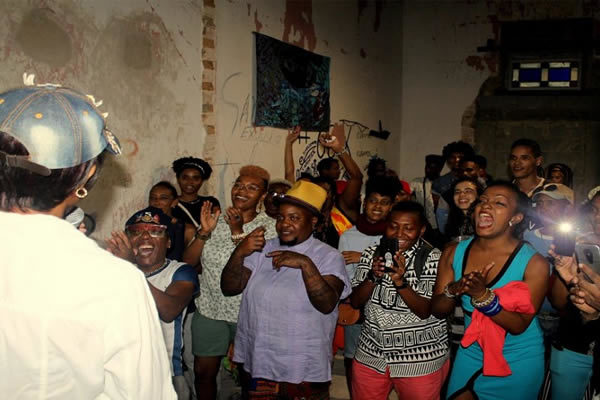
“Culturalmente somos un país machista y ese machismo, sexismo, homofobia, solo dividen. Para fortalecer la unidad, que no es esa unidad de la que se hablaba hace cincuenta años, sino esa otra unidad del nuevo pensamiento a la transformación social, a valorar lo diferente y lo diverso, para eso son estos espacios, y para eso estamos acá, en Casa Tomada Mirarte”.
Nosotres también existe
Habían pasado algunas horas desde que tomé la primera taza de café. Yo estaba allí desde las cinco de la tarde y no fue hasta pasadas las ocho de la noche que comenzó la actividad. Ya me había hecho a la ida de que no iba a comer nada en ese momento. Para comer habría tiempo…
Más de diez panelistas hablaban de sus proyectos, reían, se pasaban el micrófono unos a otros sin pena ni nervios, sin pudor. Hablaban y reían. Hablaban y hacían reír a los demás. A ratos mi estómago se entusiasmaba, hacía un ruido raro, como si riera también.
Entre las voces que se disputaban el micrófono estaba Nancy Cepero, una artista visual, grabadora específicamente. Pero también una de las mejores cocinando comida vegana.
Ya me habían hablado de ella. Había leído sobre ella, pero no la conocía. Y ahí estaba, justo en frente, sentada en el suelo, apretada entre sus colegas. No parecía importarle que la Real Academia de la Lengua Española no haya aceptado incluir todes. Porque Nancy seguía hablando con la e para sustituir la a y la o. Ella seguirá liderando Nosotres, un proyecto que funciona desde 2018.
Nancy se define a sí misma como activista. Usa el arte como pretexto evolutivo. Dice que antes veía las cosas de otra forma, incluso el propio tema de la racialidad lo entendía de un modo diferente, a la ligera. Sabe que desde pequeños usamos, tal vez de forma consciente (otras no tanto), un lenguaje racista, sexista, discriminatorio, que divide. Pero ella quiere despojarse de esos males, quiere que todes juntes luchen contra las desigualdades.
“Las discriminaciones nos tienen segmentados, pero lo importante es ver la necesidad de avanzar y crecer juntes como comunidad pero entendiendo las necesidades específicas de todes. Esa es una de las esencias de nuestro proyecto: aprender del afrofeminismo y crear espacios donde podemos ser nosotres mismes, con las libertades que uno merece”.
Para ella es fundamental que todes se sientan como una familia, que tengan la sensación de pertenecer a un hogar, aunque no tengan un espacio físico. Nosotres es un proyecto itinerante, diverso y divertido. Han empezado con un concierto, pero terminaron desayunando en la mañana.
“Porque la gente tenía muchas cosas que echar para afuera, mucho que compartir. Más allá del debate público hay una necesidad de conexión con gente común, que entiende la historia que estás contando, porque también vive como tú. En ese sentido lo logramos. Todes estamos en función de crecer juntes”.
Lideresas colombianas sanan desde el arte
El diálogo continuaba, como mismo continuaba creciendo mi hambre. Las opciones de comida estaban cada vez más lejos. La única persona que tenía fama de hacer comida para este tipo de actividades estaba sentada muy a gusto escuchando el debate, debatiendo.
Pero mi olfato no falló. Justo cuando las colombianas comenzaron a hablar sentí olor a comida. Un olor diferente al que siento en mi cocina o en la cocina de mi madre. Tal vez mi cerebro me estaba traicionando y el aroma que sentía era producto de mi imaginación, de mis deseos de comer…
Pero Jess Castaño y Vero Naki sí eran reales. Viajaron desde Colombia para participar de este encuentro, que no solo incluía un conversatorio, también prometía cerrar con un concierto.
“Nosotres vivimos en Bogotá, una capital blanquísima, donde además existe división dentro de la propia comunidad discriminada —aclaró Jess—. Si eres negra y te relacionas con gente de tu color no puedes ser marica, porque eres mal vista. Si decides participar en actividades donde haya mayor inclusión y diversidad, entonces vas a ser la única pareja de negras”.
A raíz de esa situación surge la necesidad de crear un proyecto como Posa Suto.
Jess hablaba rápido pero claro. Quería decir muchas cosas y el tiempo era poco. En cada intervención antes de la suya, asentía con la cabeza, se reía, como si entendiera qué pasa en Cuba.
“Optamos por tener nuestro propio espacio: Posa Suto. Porque llegábamos a muchos sitios y no nos dejaban entrar. Nunca nos dijeron que por ser negras pero eso estaba clarísimo”.
Vero es más calmada. Empezó a hablar sin estar preparada porque, en un arrebato, Jess le puso el micrófono enfrente y la dejó sin opciones. Entonces se escuchó su voz por primera vez.
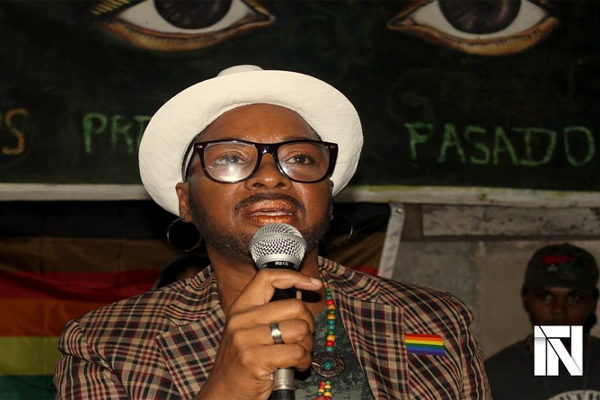
“El proyecto fue posible gracias a que ganamos una beca de la Open Society Fundations, una organización gringa dirigida a jóvenes feministas de Latinoamérica. Gracias a esa ayuda logramos tener la casa. Queríamos lograr un espacio tolerante, respetuoso, donde nadie se meta con nadie, donde cada uno tenga la libertad de ser como quiera ser.
“Muchas veces nos sumergimos en la cotidianidad. Entonces el tiempo de compartir en espacios inclusivos, diversos, es poco. Sin embargo, necesitamos compartir con personas como nosotres, que tengan las mismas dudas, los mismos problemas”.
Jess sabe que el camino seguirá siendo escabroso, que pocas veces disfrutará de sus derechos fácilmente. Porque, aunque exista Posa Suto, aún hay mucha discriminación en Colombia, como también la hay en Cuba. Para ellas lo importante es sanar desde el arte.
“Estamos convencides de que la cosa es por ahí. Nos sentimos a gusto en Casa Tomada Mirarte y estamos felices de poder reunirnos con tanta gente negra, tanta gente marica, tanta gente hermosa dispuesta a escuchar y a compartir”.
Otra vez las Krudas Cubensi
Si algo no me falla es el olfato. A veces quisiera tapar mi nariz, porque delata todos los olores que hay a mi alrededor, y son agradables, me traen recuerdos que solo se activan en mi mente gracias a que pasaron por el filtro de mi nariz. Y esta vez yo quería seguir oliendo, quería pensar que no me equivocaba, que podía comer…
Justo cuando acabó el conversatorio habló de nuevo. Lo había hecho desde el principio porque era moderadora de la actividad. Su sentido del humor era más grande que su cuerpo, y su volumen corporal no es nada despreciable. Entonces retomó el mando de la situación, ahora para anunciar que había comida. Santas palabras mágicas que salieron de su boca: “Apúrense, que hay que comer”.
En la mesa se sirvió comida vegana colorida, diversa como todas las personas que estaban en la Casa Tomada Mirarte. No hubo mejor elección. Una comida sana, diferente, con combinaciones raras pero posibles, con sabores nuevos, y poco degustada en los hogares cubanos.
Y todos comimos, y volvimos a tomar café. Y reímos. Y entramos otra vez en la zona caliente, donde antes se dialogó y ahora se escuchaba música, donde sería el concierto de las Krudas Cubensi.
Odaymara y Olivia Prendes son las Krudas Cubensi, una de las agrupaciones más importantes de la diáspora cubana. Están radicadas en Estados Unidos. Se fueron cuando aún la ley de pies secos, pies mojados invitaba a tantos cubanos a probar suerte en el país más temible del mundo.
Salieron de Cuba en el 2006 y cada año regresan. Volver las llena de energía para seguir creando. Recordaré a Odaymara Cuesta durante muchos días, quizás cada vez que tenga hambre mi mente traiga su recuerdo. Se parecía a mi madre, que primero anuncia que hay comida y después ella misma es quien te sirve el plato. Pero Odaymara es rapera, de las primeras mujeres que subió a escena para batirse en un ambiente feroz, donde el machismo estaba, y sigue estando, a la orden del día.
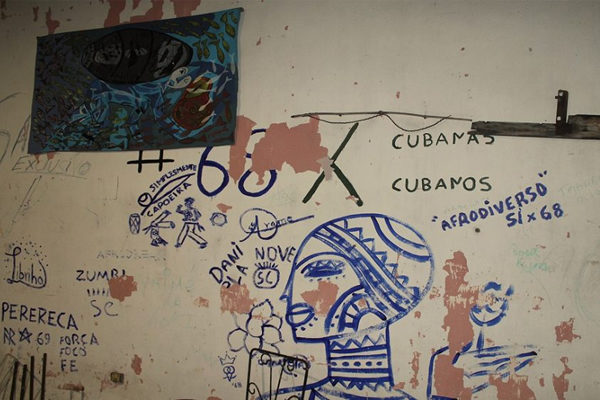
“Al final creo que estamos recogiendo el fruto de lo que Krudas fundó en el año 1999. Siempre fuimos un grupo muy futurista, muy adelantado a nuestra época. Y ahora estamos viendo que de alguna manera muchas personas están recogiendo nuestro trabajo de 20 años.
“Cuba y sus gobernantes son parte del circuito de la hegemonía blanca mestiza de toda América Latina. Y aunque hay que reconocer que se han hecho algunas cosas positivas, también hay que decir que la gente por su cuenta ha encontrado la manera de seguir adelante. Hay que emprender, porque no se puede esperar a que el gobierno dé nada”.
Según la visión de esta rapera negra y queer, Cuba sigue resistiendo.
“Antes era casi imposible pensar que existiera un espacio como Casa Tomada Mirarte. Ni la Alianza Afrocubana, ni Afrodiverso, ni Nosotres, ni ningún otro proyecto con características similares hubiera sido posible”.
No es un secreto las adversidades que sufren las personas queer. Muchos fueron los testimonios que contaron los valientes y las valientes en la casa de Myrna, de todes. Algunos felices, otros más desgarradores, porque conocer que los agentes de Policía Nacional Revolucionaria, cuya misión es proteger a la población, son de los principales agresores, es realmente triste.
Hay que multiplicar estos escenarios, trabajar en nuevas apuestas desde la perspectiva de género para combatir posturas sexistas equivocadas, la violencia de género. Es necesario que la sociedad cubana adopte un lenguaje inclusivo y tolerante, que se encamine hacia una libertad completa e igualitaria. Casa Tomada Mirarte es, casi seguro, un comienzo.
National
LGBTQ activists mourn the Rev. Jesse Jackson
Prominent civil rights leader died on Tuesday at 84

LGBTQ rights advocates have joined the nation’s civil rights leaders in reflecting on the life and work of the Rev. Jesse Jackson, the famed U.S. civil rights leader whose family announced passed away on Feb. 17 at the age of 84.
Known as a follower and associate of African American civil rights leader Dr. Martin Luther King Jr., Jackson emerged in the 1960s as a leading civil rights advocate for the Black community and other minorities for decades throughout the U.S., including in Washington.
In a less known aspect of Jackson’s involvement in politics, following his campaigns for U.S. president in 1984 and 1988, Jackson won election in 1990 as the District of Columbia’s shadow senator, a ceremonial position created to lobby Congress for D.C. statehood.
Jackson, who at that time had a home in D.C., received strong support from D.C. voters, including LGBTQ voters who became aware of Jackson’s support for LGBTQ issues. He served just one six-year term as the city’s shadow senator before choosing not to run again.
An early supporter of marriage equality, Jackson was among the prominent speakers at the 1987 National March on Washington for Lesbian and Gay Rights. Jackson joined other speakers at a rally on the grounds of the U.S. Capitol.
During his run for president in 1988 the D.C. Gertrude Stein Democratic Club, an LGBTQ group that has since been renamed the Capital Stonewall Democrats, endorsed Jackson for president ahead of the city’s Democratic presidential primary.
“The fight for justice requires courage, hope, and a relentlessness that will not be denied. Rev. Jesse Jackson embodied that fight every day,” said Kelley Robinson, president of the Human Rights Campaign, the nation’s largest LGBTQ advocacy organization.
“From disrupting political systems and building people power to helping this country imagine a freer future for all of us, Rev. Jackson was a force,” Robinson said in a statement. “His historic presidential campaigns paved the way for generations of Black leaders to imagine ourselves in rooms we were once told were closed to us.”
Robinson added, “Reverand Jackson also stood up when it mattered; when it wasn’t easy and when it wasn’t popular. His support for marriage equality and for LGBTQ+ people affirmed a simple, powerful truth: our liberation is bound together.”
She also pointed to Jackson’s support for efforts to repeal California’s Proposition 8, a 2008 referendum passed by voters to ban same-sex marriage in the state.
“Marriage is based on love and commitment, not on sexual orientation. I support the right for any person to marry the person of their choosing,” Robinson quoted Jackson as saying in support of efforts that succeeded in overturning the California marriage ban.
The national organization PFLAG, which represents parents, friends, and allies of the LGBTQ community, released a statement from its president, Brian K. Bond, citing Jackson’s longstanding support for the LGBTQ community.
“Today, as we learn of the passing of Rev. Jesse Jackson, we mourn the loss of a giant among us,” Bond said in the statement. “When many refused to acknowledge the existence and struggles of LGBTQ+ people, Rev. Jackson saw us, affirmed us, and demanded equality inclusively,” Bond said. “In his address to the Democratic National Convention in 1984, Rev. Jackson named us specifically as part of the fabric of the American Quilt,” Bond says in his statement.
The statement adds, “He has shown up for and marched with the LGBTQ+ movement through the AIDS crisis, marriage equality, and ever after. Rev. Jackson’s leadership and allyship for LGBTQ+ people will be felt profoundly by his PFLAG family. We will continue to honor his legacy as we continue to strive to achieve justice and equality for all.”
D.C. Mayor Muriel Bowser, citing Jackson’s role as a D.C. shadow senator, said for many in the country, Jackson “was the first person they heard make the case for D.C. statehood. The first person they heard say: it’s the right thing to do.”
Bowser added, “In 1988, he said that we were at a crossroads, and he posed this question: Shall we expand, be inclusive, find unity and power; or suffer division and impotence? It is a question as relevant today as when he asked it,” the mayor said, “And in Rev. Jackson’s name and memory, we must continue fighting for the answer we know our nation deserves.”
D.C. Congressional Delegate Eleanor Holmes Norton (D) said she was honored to have worked with Jackson during his tenure as D.C. shadow senator and throughout his years as a civil rights advocate.
“From the front lines of the civil rights movement to national campaigns that expanded the political imagination of this country, Jesse Jackson lifted up the voices of those too often unheard,” Norton said in a statement. “He turned protest into progress and transformed moral conviction into political action”
According to Norton, “His work-built bridges across race, class, and geography, helping redefine what inclusive democracy could look like in America.”
National
Trump falsely links trans people to terrorism
Intelligence agencies threatening to investigate community members as domestic terrorists

Uncloseted Media published this article on Feb. 14.
By HOPE PISONI | In December, Kathy Brennan was in San Francisco on a video call with her wife and son when she started to feel a burning pain in her chest. While she ignored it at first, it quickly spread to more of her body until it was too much to bear. She called 911 and was brought to the hospital on a stretcher.
“My entire chest was just crushed in pain, I couldn’t even move it was so bad,” Brennan told Uncloseted Media. “I said ‘God, I am not ready to die here. Please don’t let me die.’ I was thinking about Alaina, and we have so much more life together.”
Brennan spent the next few days recovering in the hospital from what doctors determined to be a stress-induced heart attack.
Brennan had spent the past year in a near-constant state of what she called “safety monitoring” her wife, Alaina Kupec.
She obsessively followed the news about the Trump administration’s attacks against the trans community, especially as officials began openly labeling trans people as terrorists. Everywhere she went, she mentally patrolled for how to keep her wife safe.
“Is our home safe? Is my wife safe? Are we safe? What do we have to do? … Can we protect ourselves if people come to our door? What do we have to worry about when we go to the grocery store? Are we gonna get doxxed?” Brennan remembers thinking.
Kupec, a trans naval intelligence veteran, is an outspoken advocate for trans rights and is the founder president of Gender Research Advisory Council + Education (GRACE).
“I think the big worry is that she will be taken away from me and we won’t be able to find her. … Then, just for the sheer sake of cruelty, my beautiful, feminine woman of a wife, they would put her in a men’s prison.”
Brennan’s fear reflects that of many trans Americans and their loved ones. In the aftermath of the assassination of anti-trans conservative activist Charlie Kirk, the Trump administration and its allies began taking actions to target socially progressive people and organizations as terrorists, with a focus on trans people. In September, Trump signed an executive order designating Antifa, a decentralized movement focused on militant opposition to fascism, as the first ever “domestic terrorist organization.” At the same time, the closely allied Heritage Foundation — who penned Project 2025 — began pushing for the creation of a new national security designation called “Transgender Ideology-Inspired Violent Extremism.”
Shortly after, Trump released National Security Presidential Memorandum (NSPM)-7, which directs intelligence agencies to investigate left-wing political organizations for involvement in domestic terrorism, singling out “extremism on migration, race, and gender” and “hostility towards those who hold traditional American views on family, religion, and morality.”
The unfounded trans terrorism panic has swept right-wing spaces, and experts say that it’s putting trans people in danger.
“If people are told, day after day, especially from … people with that veneer of legitimacy, that this entire group of people … is implicitly a dangerous terrorist, that sends that message that these people are able to be targeted for violence,” Jon Lewis, a research fellow at the Program on Extremism at George Washington University, told Uncloseted Media.
The what and the why
While Trump relied on anti-trans messaging since he began campaigning in the 2024 presidential election, his portrayal of trans people as a national security threat emerged in response to an August 2025 mass shooting in Minneapolis, where a trans person killed two children. While the overwhelming majority of mass shooters are cisgender men, right-wing figureheads blamed the shooting on the perpetrator’s transness.
While Kirk’s assassin is cisgender, early reports falsely claimed that he had engraved pro-trans messages onto his bullets, which conservative figures like Megyn Kelly and Laura Loomer used to blame trans people for the killing. “It’s time to designate the transgender movement as a terrorist movement,” Loomer said the following weekend on X. And Vice President JD Vance suggested that he considers trans people to be part of a “terrorist movement.”
The Trump administration picked up on this rhetoric to justify its actions: the Antifa executive order and NSPM-7 both reference Kirk’s assassination as well as either trans people or “extremism on gender.”
As these policies began rolling out, independent journalist Ken Klippenstein reported that the FBI was preparing to designate trans people as “nihilistic violent extremists.” A leaked intelligence brief showed that U.S. Customs and Border Protection had centered the focus of one extremist group on their trans membership, referring to them as a “radical leftist trans militant cult.”
How these actions will be enforced remains to be seen. At least two trans women are currently jailed and awaiting trial over an anti-ICE protest where a local police officer was shot by a cis man, which the Department of Justice claims was connected to an “Antifa Cell.” It is not known whether the government will attempt to use the defendants’ transness to implicate them in terrorism charges.
And leaked documents indicate that the FBI is compiling a list of groups and individuals involved in extremism based on a number of beliefs including “radical gender ideology.” Their ability to compile such lists may be enhanced by a policy change from the Department of Homeland Security last February that allows the government to surveil people based on their sexual orientation or gender identity.
While some have questioned to what extent the administration intends to actually enforce all of these policies, experts say that the fact they’re being discussed poses a serious risk.
“From 9/11 onward, the United States has been leading a ‘global war on terror,’ so to label somebody as a terrorist is a rallying cry for violence and discrimination,” says Arie Kruglanski, a professor of psychology at the University of Maryland. “This term of terrorism calls people to action. … Once you label somebody as a terrorist, then clearly they present a mortal danger to society, and they need to be fought against.”
‘Tremendously damaging’
Lewis says that being exposed to these attacks can be “tremendously damaging.”
“It’s not even that there are [always] explicitly these immediate legal repercussions that some person will face, but it’s that othering, it’s that sense of fear every day,” he says.
That fear has caused Jewels Jones to withdraw from public life. Jones, a trans man from the South, says that the anti-trans vitriol online after Kirk’s death became too much to handle, and he had to leave social media almost entirely.
“I’m 23, I should be on social media, but I can’t because if I even go onto my timeline, something can trigger me,” Jones told Uncloseted Media. “[I miss] the feeling of freedom.”
With community often hard to find, Jones says he and several other trans people he knows have been struggling with substance use.
“Everyone here has their own reasons for turning to things such as drinking and smoking and partying and just finding [a way] to feel numb or ignore what’s going on,” Jones says. “Just being trans and having to see how everybody views you, how you’re perceived, how you’re feeling, all these different emotions that you feel is more than enough of a reason [to] turn to those things.”
PJ, a trans man from a small town in Arizona, who asked to remain anonymous because he is not out, says that after Trump’s inauguration, he’s started to hide his transness. And he’s not alone: Since the 2024 election, 55 percent of trans people have taken steps to be less visible in their communities.
“It is torture,” PJ says. “I do not like having to lower my voice when I speak to prevent sounding androgynous. I do not like having to hide away my wardrobe for ‘being too gay.’ There is no comfort in overcompensation.”
Individuals aren’t the only ones stepping into the shadows. Kupec has been withdrawing herself and her nonprofit from the internet as much as possible. She says GRACE used to host monthly calls, where as many as 100 people would join to hear from experts on issues facing the trans community. But now, they no longer have public meetings, and internal communications have moved to Signal, an encrypted messaging app.
“We have backed off of doing those things because of the fear of how this could be leveraged against us,” Kupec told Uncloseted Media. “It’s had a chilling effect on our ability to exercise our freedom of speech as individuals and as a nonprofit organization.”
Trying to leave
Because of this fear, many trans Americans are trying to leave. A survey by the Movement Advancement Project found that 43 percent of trans Americans had considered moving to a different state since the 2024 election, with 9 percent having already moved. And the Williams Institute found that 45 percent of trans people wanted to move out of the country.
Kupec has watched noteworthy friends disperse across the globe: Rachel See, the former chair for National Center for Transgender Equality, moved to Portugal; and author and advocate Brynn Tannehill moved to Canada.
“That’s part of what [the administration’s] desired outcome is, to get people to self-deport,” Kupec says.
For many, relocating isn’t easy: For 64 percent of trans people who want to move out of state, cost of living was cited as a barrier. PJ has been trying to move for years. But within the U.S., relatively LGBTQ-friendly states like California and Massachusetts have much higher costs of living, making moving there financially challenging.
Moving internationally is no small feat either — every country has its own laws to navigate around immigration.
PJ says he kept running into barriers while trying to leave. The Netherlands initially seemed promising, but he discovered that the path to residency required him to start a business, which he couldn’t afford to do. Other countries fell through because he didn’t have the money to cover application fees. The closest he got to making it out was when a friend on the east coast of Canada offered to let him stay with them for a while. But it fell through when the friend’s septic tank collapsed, ruining the house and forcing PJ back to the U.S.
“It seems like every plan that you make to try to get out of here, it just gets squashed,” he says.
Those barriers have gotten scarier for PJ as the clock may be ticking for him to be able to leave. In November, the Supreme Court allowed the Trump administration to enforce a ban on passports with gender markers that do not align with an individual’s birth certificate, with the State Department’s website suggesting that passports which have already been updated may be invalidated.
Given all of these threats, PJ believes that trans Americans should be able to seek asylum in other countries. Applications for asylum by trans Americans have been rejected in countries including the Netherlands and Canada, and most European countries don’t view the U.S. as dangerous enough to grant refugee status despite many having issued travel advisories for trans residents visiting the country.
“We can’t really claim asylum right now so there’s not really many other options but sink or swim,” PJ says.
There have been some efforts to push for asylum status for trans Americans. Politicians, advocates and lawyers in Canada and Norway have called for their respective governments to accept trans Americans as refugees. And in July, a Canadian judge blocked the deportation of a nonbinary American who overstayed their visa, with one of the factors considered in the decision being “current conditions for LGBTQ, nonbinary, and transgender persons” in the U.S.
Finding hope and respite
In the face of all this, finding a support network can be crucial to survival. While community has been especially hard to find in the South, Jones says that he’s been able to connect with other transmasc people via reddit communities like r/TMPOC (Trans Masculine People of Color) or r/testosteronekickoff.
Kupec and Brennan find solace through their 12-year relationship. Brennan says, “I love her more now … than I did when I first fell mad smack in love with her.”
“Having love where there’s respect and kindness and joy and excitement and it goes both ways, that is really unique, not a lot of people have that,” she says. “But when you do have it, it’s like, ‘I wanna preserve this and protect this with every ounce of my energy and soul because it’s the center of my life,’ and I know that she feels that way too.”
As Brennan recovers from her heart attack, she’s been watching less news and joined a book club to connect with other people. Kupec, a Catholic, has been putting her faith in God to get through.
“I know who I am, I know my maker knows who I am, and I have strong faith that by doing the right thing, at the end of the day, that’s what’s going to win out.”
Additional reporting by Sam Donndelinger.
Virginia
Fellow lawmakers praise Adam Ebbin after Va. Senate farewell address
Gay state senator to take job in Spanberger administration

Gay Virginia state Sen. Adam Ebbin (D-Alexandria) delivered his farewell address on Feb. 16 in the Senate chamber in Richmond following his decision to resign from his role as a lawmaker to take a position as senior advisor to Democratic Gov. Abigail Spanberger.
Ebbin, whose resignation was to take effect Feb. 18, received a standing ovation from his fellow senators. Several of them spoke after Ebbin’s address to praise him for his service in the Virginia Senate from 2012 to 2026.
Ebbin first won election to the Virginia House of Delegates in 2003 as the first openly gay member of the General Assembly. He served in the House of Delegates from 2004 to 2012 before winning election to the Senate in 2011.
His Senate district includes Alexandria and parts of Arlington and Fairfax Counties.
“Serving in this body has been the greatest honor of my life,” Ebbin said in his farewell address. “Representing Northern Virginia in the General Assembly — my adopted home since 1989 — has been a responsibility I never took lightly,” he said.
“We are a 406-year-old institution,” he told his fellow lawmakers. “But, when I arrived, I had the distinct honor of being a ‘first’ in the General Assembly,” he said. “Being an openly gay elected official 22 years ago didn’t earn you book deals or talk show appearances — just a seat in a deep minority across the hall.”
Ebbin added, “Still, being out was a fact that felt both deeply personal and unavoidably public. I was proud, but I was also very aware that simply being here carried a responsibility larger than myself.”
Ebbin has been credited with playing a lead role in advocating for LGBTQ rights in the General Assembly as well as speaking out against anti-LGBTQ proposals that have surfaced during his tenure in the legislature.
In his speech he also pointed to other issues he has championed as a lawmaker; including strengthening education programs, expanding access to healthcare, safeguarding the environment, and legislation to help “stand up for working people.”
Among the LGBTQ rights legislation he pushed and mentioned in his speech was the Virginia Values Act of 2020, which bans discrimination based on sexual orientation and gender identity, among other categories.
“I’m particularly proud of our work ensuring Virginia modernized state law to protect LGBT people from discrimination in their daily lives, including in employment, housing, and public accommodations,” he said in his speech. “The Virginia Values Act of 2020 — my proudest achievement — established new protections for all Virginians,” he said.
“This law, the first of its kind in the South, passed with strong bipartisan support,” he stated. “And now — this November — after 20 years, Virginians will finally be able to vote on the Marriage Equality Amendment, which will protect the ability to marry who you love. It’s time for our state constitution to accurately reflect the law of the land.”
He was referring to a proposed state constitutional amendment approved by the General Assembly, but which must now go before voters in a referendum, to repeal a constitutional amendment approved by the legislators and voters in 2006 that bans same-sex marriage.
The U.S. Supreme Court’s Obergefell ruling legalizing same-sex marriage nationwide voided the Virginia same-sex marriage ban. But Ebbin and LGBTQ rights advocates have called on the General Assembly to take action to repeal the amendment in case the Supreme Court changes its ruling on the issue.
In his new job in the Spanberger administration Ebbin will become a senior advisor at the Virginia Cannabis Control Authority, which regulates policies regarding marijuana possession and distribution.
Ebbin was among the lead sponsors of legislation in 2020 to decriminalize possession of marijuana and of current pending legislation calling for legalizing possession.
“When I first entered the General Assembly, I saw too many lives upended by a simple marijuana charge — jobs lost, futures delayed, families hurt,” he said in his speech. “And for far too long, that harm was baked into our laws. That is no longer the case. The times have changed and so have our laws.”
Ebbin said he was also proud to have played some role in the changes in Virginia that now enable LGBTQ Virginians to serve in all levels of the state government “openly, authentically, and unapologetically.”
“I swore to myself that I wouldn’t leave until there was at least one more lesbian or gay General Assembly member,” Ebbin said in his speech. “But when I leave, I’m proud to say we will have an 8-member LGBTQ caucus.”
And he added, “And if anyone on the other side of the aisle wants to come out, you will be more than welcome — we’re still waiting on that first openly gay Republican.”
-

 State Department4 days ago
State Department4 days agoFOIA lawsuit filed against State Department for PEPFAR records
-

 Opinions5 days ago
Opinions5 days agoTrans sports bans rooted in eugenics
-

 New York4 days ago
New York4 days agoPride flag raised at Stonewall after National Park Service took it down
-

 India4 days ago
India4 days agoTrans students not included in new India University Grants Commission equity rules

